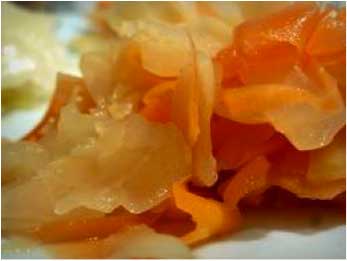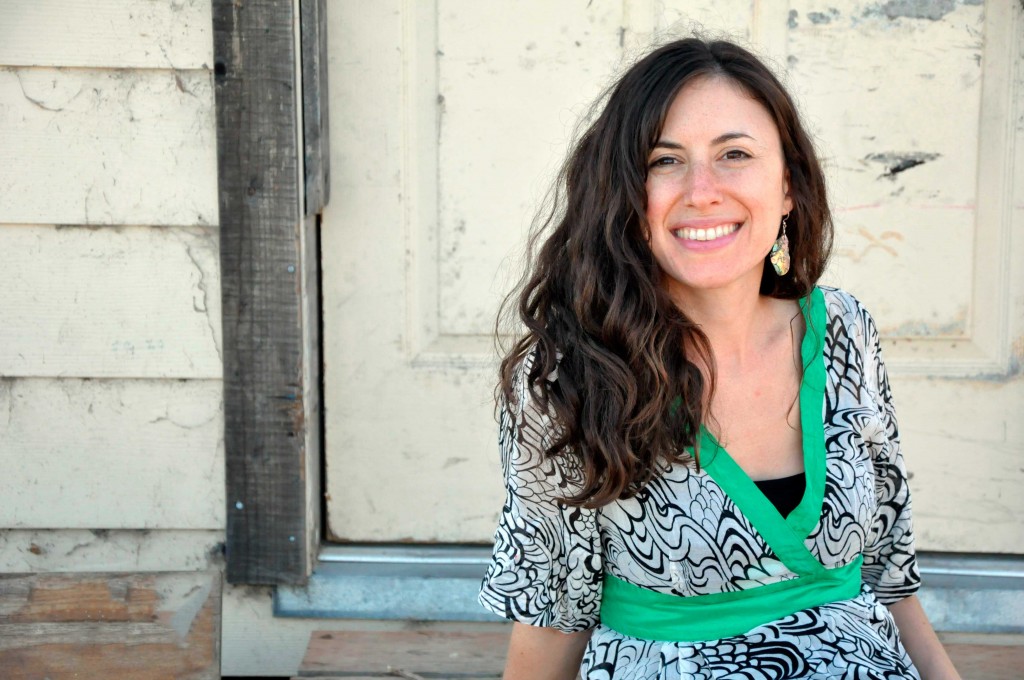
Making raw sauerkraut is a great way to start experimenting with preparing your own fermented foods because it is super easy and affordable. Conventionally-prepared sauerkraut is cooked in brine, and does not contain the beneficial bacteria (learn more about probiotics) that traditionally prepared, raw sauerkraut contains. Most natural food stores sell raw sauerkraut, which is a great option, though sometimes quite pricey. Here’s a simple recipe to start you off:
Raw Sauerkraut
Ingredients
1 head green cabbage
1 Tablespoon grated fresh ginger (optional)
2 carrots, grated (optional)
1 Tablespoon sea salt
Directions
1. Grate or slice thinly the cabbage and pound with mallet to release the juices. Save the outer leaves of the cabbage and set aside.
2. Shred the carrots and add to the cabbage. Mix in the ginger and salt.
3. Place in a ceramic pot or glass container, like a large mason jar.
4. Cover the mix with the saved outer leaves of the cabbage. Place a plate on top of the leaves. Put a 4 or 5 pound weight on the plate (a brick, a bottle of sand). Cover the container with a piece of cheesecloth and then with a loose lid.
5. Leave at room temperature for 3-5 days, until desired taste is achieved. Then refrigerate.
6. When ready, remove the lid and the outer leaves and discard. Store the kraut in the refrigerator in a glass jar. It can be used immediately and will continue to ferment as it ages.
When Is It Ready?
The kraut is "ready" when it suits your taste. You can let it go longer than I've indicated above, if you like a stronger flavor. Then you discard the leaves on top, and put it an airtight jar. Refrigerating will slow, but will not completely stop the fermentation process. Sauerkraut will last a few weeks in the refrigerator.
You can put kholrabi in your sauerkraut, but you need the cabbage in as the main ingredient to get the fermentation going, since cabbage has bacteria already on it that aid in fermentation.
About Brooke
 Brooke Kaufman is a Certified Holistic Nutrition Consultant who creates customized meal plans for her clients with multiple food allergies and intolerances. She enjoys helping people eat nourishing food that is easy to prepare and tastes delicious. She believes that having food allergies and intolerances can be a positive challenge that inspires creativity, and brings a higher level of awareness when it comes to what you put in your body. Brooke believes that when we deeply nourish ourselves inside and out, we can attain optimal health…which includes healing our damaged and inflamed digestive systems.
Brooke Kaufman is a Certified Holistic Nutrition Consultant who creates customized meal plans for her clients with multiple food allergies and intolerances. She enjoys helping people eat nourishing food that is easy to prepare and tastes delicious. She believes that having food allergies and intolerances can be a positive challenge that inspires creativity, and brings a higher level of awareness when it comes to what you put in your body. Brooke believes that when we deeply nourish ourselves inside and out, we can attain optimal health…which includes healing our damaged and inflamed digestive systems.
Brooke received her nutrition education at Bauman College, and has learned through her own personal experience with food intolerances, she also works as a cleanse coach for Cleanse Organic, a 28-day, guided whole food based cleansing program.
Find her at: Balance Within Nutrition